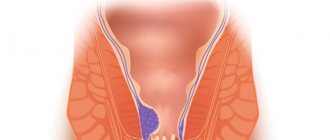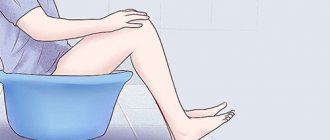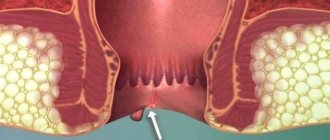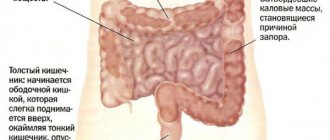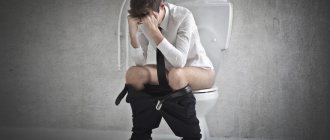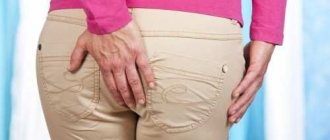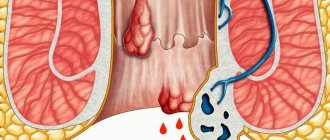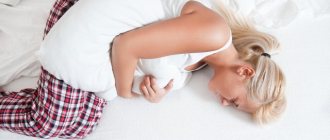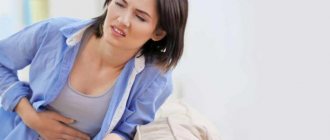The disease comes in internal and external forms.
Igor, Magnitogorsk: Hello! Sometimes a node comes out of the anal canal. I wait a long time for it to pull back in, I’m afraid to touch it with my hands. Tell me how to fix hemorrhoids yourself at home? And can this be done without the help of a doctor? Why is this happening? Thank you.
Hemorrhoids are a disease that appears at least once, in the form of initial symptoms, in eighty out of a hundred people. For many, the symptoms of the disease will remain an isolated incident. In others, the disease will develop to a stage where enlarged hemorrhoids begin to prolapse from the rectum.
Do external hemorrhoids need to be reduced?
There are many hemorrhoidal plexuses of veins in the rectum. In a normal state, they are not visible or palpable. In case of weakening of the ligament, loss of elasticity and tone of the venous vessels, the hemorrhoid comes out.
This can happen due to:
- Lifting heavy objects. If a patient has a predisposition to hemorrhoids, then intense sports and carrying heavy objects are strictly contraindicated for him. They increase intra-abdominal pressure and disrupt blood flow in the pelvic area.
- Chronic constipation. If defecation is difficult, the patient begins to pout excessively to get rid of feces, and at the same time “squeezes out” hemorrhoids.
- Decreased muscle tone of the anal sphincter.
- Injury to the rectum. They can be provoked by anal sex, frequent diarrhea, and constipation. The presence of cracks in the anus also contributes to the prolapse of hemorrhoids.
Even a strong hacking cough can cause external bumps to appear.
According to their manifestation, hemorrhoids are divided into two types: internal and external (external). It is the latter that is characterized by frequent prolapse of hemorrhoidal nodules.
You need to reduce a node that has just emerged from the anus. Subsequently, this becomes increasingly difficult to do. If the dropped nodes are not reset, strangulation may occur. This is a very painful condition and increases the risk of blood clots forming inside the hemorrhoid.
Causes of hemorrhoidal plexus prolapse
Nodes protruding from the anus are a characteristic sign of stage 2 hemorrhoids. During this period, they fall out only during bowel movements, and after cleansing the intestines they are pulled back into place without any problems. The patient does not feel any discomfort during this period. Disturbances in the rhythm of defecation, which often accompany hemorrhoidal disease, force the patient to sit on the toilet longer than usual. This posture and the efforts made during defecation provoke overstrain of the hemorrhoidal veins. Additional blood flow and obstructed outflow causes their increase. Under their own weight and the influence of feces, carrying the nodes along with them, they move lower and lower until they reach the anus.
The bumps protruding from the anal ring are very vulnerable: even toilet paper causes pain, cracks, and abrasions. Wounds take a long time to heal; the constant presence of feces contributes to the development of inflammation. The patient feels unpleasant itching and burning in the problem area.
Regular loss of nodes weakens the sphincter muscles. Often this condition is accompanied by damage to the mucous membrane, especially in the area where it is adjacent to the skin. Deep and painful anal fissures appear.
As the prolapsed nodes increase in size, they no longer correct themselves on their own, since the sphincter muscles are not able to hold them. These symptoms indicate the transition of the disease to the third stage. Now knots will fall out not only on the toilet, but also during any physical stress (sudden lifting of weights, coughing, fit of laughter, etc.).
At the most severe, fourth stage of hemorrhoid development, the anal muscles do not hold the nodes even in a calm state. It is impossible to put them back in place even temporarily. This procedure is painful and useless. Fortunately, not everyone reaches this state - when the nodes fall out, the majority still decide to visit a proctologist.
Falling out cones are not a cosmetic defect, as there is always a danger of pinching them. This happens when they are incorrectly adjusted, during sudden movements or straining during the act of defecation. Stagnation of blood creates conditions for the formation of blood clots with the most tragic consequences: from plexus rupture and tissue necrosis to sepsis. Complications can only be avoided if you consult a proctologist in a timely manner. He will advise you on how to straighten the hemorrhoid yourself, if such manipulation still makes sense, and will offer his own options for solving the problem.
https://youtu.be/nzfRUcMq8Ic
How to set a hemorrhoid yourself
The average person lacks the specialized skills needed to properly and safely reduce hemorrhoids. It is better, of course, for this procedure to be performed by a professional proctologist. The doctor will return the formation to its place quickly, without causing damage to the rectum and as painlessly as possible for the patient.
In the clinic, the procedure takes a minimum of time. The doctor will put on latex gloves, numb the patient's anus with Heparin ointment or another anti-hemorrhoid drug, and gently insert the lumps back into the rectum.
If the manipulations still lead to bleeding, the patient will be hospitalized, since this symptom indicates thrombosis of the hemorrhoidal cone.
If a visit to the hospital for some reason is not possible, and the problem needs to be solved here and now, then the patient can try to cope on his own.
To do this, you need to strictly follow a number of rules.
Step-by-step instruction
Before you begin to return the nodes to their place on your own, you must thoroughly wash the rectal area and pat it dry with a soft towel, being careful not to disturb the inflamed lumps too much. For these purposes, you can use a shower or bidet. It is important to remember that the water should not be hot, but rather cool.
And now the instructions themselves:
- Apply a cold compress to and around the anus for 5-10 minutes. You can use a handkerchief, previously soaked in water and cooled in the freezer. This is done in order to relieve swelling, reduce inflammation and irritation, and also reduce pain.
- Soften and numb the affected area using special ointments or sprays.
- Wear sterile medical gloves to reduce the risk of infection in open wounds.
- Squat down and spread your buttocks with your left hand (if you are left-handed, then with your right).
- Using the fingers of the other hand, lubricated with Vaseline, slowly and gently rotate clockwise, try to straighten the knots by lightly pressing on them.
- Having achieved that the nodules are on the other side of the sphincter, sharply and strongly contract the muscles of the anus so that the lumps are fixed.
- Bring your buttocks together tightly with both hands to complete the fixation.
- If you were not successful the first time, you should repeat the manipulations described in paragraphs 4-7.
After completing the procedure, you should lie down for 30 minutes.
If discomfort from burning and itching persists around the anus, you can reapply a cold compress or even a cooled rectal tablet. If, of course, the body temperature is normal and there is no pronounced inflammation.
To soothe the disturbed area, it is recommended to place a tampon moistened with sea buckthorn or rosehip oil. This will help relieve pain and increase tissue elasticity.
If bleeding occurs, put in a suppository that has astringent properties or contains antibiotics.
In the first time after successful reduction of the lump into the rectum, it is very important to limit physical activity and reduce physical activity. In addition, you should lead a more active lifestyle and sit or stand less.
Video
Hemorrhoids occur in people of all ages. It is very important not to miss the first signals from the body that let you know that a failure has occurred.
If hemorrhoids appear outward, it means that the disease has entered an advanced stage of development.
At the initial stages, this pathology cannot be determined independently. Only a proctologist will conduct an examination and make a diagnosis.
Hemorrhoids manifest as unpleasant sensations in the anal area. It is also accompanied by itching, a feeling of heaviness in the rectum and anus.
A little later, hemorrhoids will manifest themselves in the form of small and then heavy bleeding, which is caused by the fact that inside the rectum the hemorrhoids are compressed by fecal matter passing through its area.
It is for this reason that blood is discharged during or after going to the toilet. Often, patients are not wary of hemorrhoids.
Seeing a doctor is observed in the later stages of pathology development. Someone cannot do this earlier due to their shyness, when others do not take the disease as a serious cause for concern.
Both solutions are wrong. A visit to the doctor is a mandatory measure to quickly eliminate the unpleasant disease.
What absolutely should not be done
The acute form of hemorrhoids makes the patient forget about the simplest rules. He is ready to try on himself all possible and impossible ways to relieve the pain. Still, it is worth remembering that rash actions and illiteracy in medical matters can cause serious, and sometimes irreparable, harm to health.
It is strictly prohibited:
- Warm external hemorrhoids using a heating pad, warming ointments, hot bath, or any other means. This will invariably lead to severe bleeding, an increase in the formation in size, swelling and inflammation.
- Apply drugs with untested effects. In an effort to relieve pain and reduce the symptoms of the disease, you should not resort to using medications whose properties and purpose you do not know. Otherwise, there is a risk of having the opposite effect. Then the doctor who you will have to turn to will need to first eliminate the consequences of self-medication, and only then proceed directly to eliminating the original problem.
Movements when manipulating hemorrhoids should be extremely soft and smooth. In the event of a sharp and aggressive impact, they may be damaged and, as a result, severe bleeding will begin.
When a lump is pinched as a result of a spasm, blood flow may be disrupted, which in turn will lead to the formation of a blood clot.
Under no circumstances should you reduce the formation without wearing sterile gloves. When an infection enters a hemorrhoidal cone, a severe inflammatory process occurs, which complicates the course of the disease. Sometimes the node itself becomes the cause of infection and intoxication of the body. Necrosis of the node can lead to blood poisoning and sepsis.
What should you not do if nodes fall out?
It is strictly forbidden to reduce nodes if there are signs of thrombosis, entrapment or necrosis. As we have already said, these complications are direct indications for visiting a proctologist.
You also need to understand that any sudden movements during the reduction of nodes can damage the tissue, which will cause bleeding and inflammation. Therefore, all movements during this procedure should be careful and light, and in no case should you try to straighten the lumps if they cannot be straightened.
How to fix hemorrhoids yourself at home
You can find many videos on the Internet on how to cope with the prolapse of hemorrhoids without going to the clinic. They contain detailed instructions and tips.
Most often, the prolapse of hemorrhoids occurs due to excessive physical exertion or if you pout too much during bowel movements. Even after moving the lump back into place, there is a possibility that the same thing will happen again. If the formation is of impressive size and the anal muscles are quite weak, then re-prolapse cannot be avoided.
To prevent recurrent prolapses or at least minimize them, you can perform exercises to strengthen the muscles of the anus. To do this, you need to alternately squeeze and relax them. When compressed, the anus is pulled into the anus, and when relaxed, it returns to its original state. This exercise does not require a specific position. It can be performed standing, sitting, or lying down. It is not noticeable to others, so you can do it while sitting at your workplace, standing at a public transport stop, and in any other place convenient for you.
It should be remembered that self-medication can delay the cure for hemorrhoids for many years. With proper therapy, which can only be prescribed by a professional proctologist after conducting the necessary examination, external hemorrhoids recede in an average of one week. Patients who prefer to cope with the disease on their own, being embarrassed by it, usually stop treatment after stopping an attack of acute pain. And untreated hemorrhoids begin to progress again and again over time.
Stages
There are 4 stages of hemorrhoids:
Worrying stages of the disease
- Symptoms appear only with strong physical exertion, hypothermia, prolonged sitting, temperature changes, mechanical stress, constipation; frequent periodic diarrhea - severe itching, burning, slight aching pain, pulsation; fast treatment.
- Short-term bleeding after defecation; the nodes are slightly enlarged, with external ones – prolapse with independent retraction; severe bleeding during movement; pain can radiate to the pelvic bones - stagnant blood, inflammation of soft tissues, a reactive process begins; conservative treatment possible
- Dystrophy of the sphincter as a consequence, impaired blood supply - tissue necrosis; the nodes are not retracted; severe pain during reduction; internal components may fall out; severe bleeding and unbearable pain during bowel movements and movement; loss of strength - only surgery.
- The nodes cannot be reduced; constant inflammation of hemorrhoidal and adjacent tissues.
Contraindications
Self-medication is not recommended in any case. But if you still decide to independently reduce the prolapsed hemorrhoids, you should remember that there are a number of restrictions when you should absolutely not do this:
- There is a suspicion that a blood clot has formed inside the lump.
- The nodules are severely pinched. When there is an infringement, the pain syndrome is so strong that it is simply not possible to cope with the problem. Repositioning them into the rectum must be accompanied by strong pressure, but pain prevents this.
- Severe anal bleeding. If blood streams from the anus, this may indicate an internal rupture. In this case, violent influence can only worsen the situation.
- A pronounced inflammatory process and a significant increase in body temperature. These symptoms may indicate incipient sepsis. Then you need to immediately seek qualified help.
- The nodes are subject to reduction as long as we are talking about the first two stages of the disease. In the future, this procedure is extremely dangerous, and trying to straighten the nodes is not recommended, especially at home.
Reduction of hemorrhoids in the hospital
When the prolapse of a hemorrhoid is accompanied by blood, severe pain, and there is blood in the stool, then it is not worth the risk.
You need to go to the hospital for help. In a hospital setting, the doctor will perform the manipulation. He will do everything the same way a patient could do the procedure at home.
The use of drugs with Novocaine or Lidocaine is provided as an anesthetic.
To soften the mucous membrane, use “Heparin” or “Troxevasin” ointment. The products should be at home so that the patient can apply them to problem areas at a convenient time. The problem should not overtake a person by surprise.
It will be more convenient for the doctor to examine the node, because in the case of home reduction, you have to work by touch. There are only 5 steps to complete the procedure:
- The patient assumes a knee-elbow position.
- Applying an anesthetic to the mucous membrane.
- Fabrics need to be treated with a softening compound.
- The specialist will straighten the knot and ask the patient to tighten the sphincter.
A view of the inside of the rectum is not available, and therefore the doctor will determine the previous location of the lump, relying on his experience. If difficulty arises, it is customary to use an anoscope.
If the problem is not solved, the node constantly falls out, which means that surgical intervention is no longer possible.
Prevention of hemorrhoid prolapse
You can prevent the loss of inflamed hemorrhoids by following the rules for preventing the disease. The diet is adjusted to eliminate frequent constipation. Avoid fried and fatty foods. The menu should not contain hot seasonings, marinades, or sauces. Significantly limit sweets, chocolate, and flour products. Alcohol and smoking are prohibited.
Basic postulates of the new diet:
- take modest portions of food up to 6 times a day;
- cook food by steaming, stewing in water, baking without crust;
- introduction of fiber into the diet - cereals, vegetables, fruits;
- fermented milk products will enrich the diet with probiotics;
- lean meat, especially young beef, is necessary as a source of iron during bleeding;
- drink from 1.5 to 2 liters of liquid, giving preference to pure water, juices diluted by half, compotes, herbal teas with chamomile and mint, and rosehip decoction.
Physical activity is important for preventing prolapse of nodes. You can do exercises that don't involve lifting weights. This includes walking, light jogging, swimming, yoga, Pilates, aerobics. The main thing is that physical education brings positive emotions, improves vascular tone, and reduces the severity of symptoms.
Self-reduction of a hemorrhoid at home is possible if there is no strangulation or thrombosis. Manipulations are done carefully and delicately. In case of acute pain, swelling of the cones, bleeding, seek medical help. Pregnant women and women in labor should agree on the method of repositioning nodes with a proctologist and obstetrician-gynecologist. You can prevent the loss of nodes by following a diet and moderate physical activity.
How to avoid relapse?
To prevent hemorrhoids from falling out, a patient suffering from hemorrhoids needs to follow some simple recommendations:
Important! The patient also spends more time on quiet walks in the fresh air, swimming and gymnastic exercises. Maintaining an active lifestyle will have a positive effect on the patient’s well-being and minimize the risk of hemorrhoids.
Hemorrhoids are a very serious disease, so experts advise trying to prevent its development rather than treating it later. As a preventive measure it will be enough:
- Eat properly. The daily diet should consist of fermented milk, fresh vegetables and fruits, natural drinks and fruit and berry jelly. The consumption of fried, spicy and pickled foods should be minimal,
Drink enough water. The required volume can be calculated using the formula 40 ml per kilogram of human weight,
Following these simple tips will minimize the risk of developing many diseases and will significantly improve a person’s well-being.
Traditional medicine against hemorrhoids
You can treat the disease yourself using folk remedies.
For external nodes, sitz baths in warm or hot water are used. Herbal decoctions that have an anti-inflammatory effect (chamomile, St. John's wort, sage, calendula) added to the water have a therapeutic effect.
A steam bath helps get rid of unpleasant sensations. To carry out the procedure, a clay container is used, covered with a lid with a hole whose diameter does not exceed 5 cm. Boiling water with the addition of alum and onion tincture with milk is poured into the container. Take a bath until steam formation is complete, then lubricate the sore spot with Vaseline.
Hemorrhoids can be cured with an ointment made from petroleum jelly, lanolin or vegetable oil. Add honey, propolis, birch tar to the base and mix thoroughly. The resulting mixture is applied to the node.
Cold lotions, the material for which can be an infusion of strawberry leaves, crushed rowan berries, beets, and carrots, have a therapeutic effect. To lubricate the nodes, diluted juices (onion or potato) are used.
For internal components, self-made candles are used. To do this, mix the components of the ointment described above, adding butter, starch or flour. The mass is rolled up, placed in a thick paper mold and cooled in the refrigerator.
How to prevent hemorrhoids from getting worse
Avoid straining during bowel contractions. One of the most common causes of hemorrhoids is excessive straining when going to the toilet. This may be caused by constipation or chronic diarrhea associated with digestive disorders such as irritable bowel syndrome or Crohn's disease. Hemorrhoids can also be aggravated by prolonged sitting on the toilet due to external distractions such as reading or playing on a smartphone.
Don't sit on the toilet longer than necessary!
Try to raise your legs slightly while defecating. This may provide relief by reducing bowel movements.
Constipation is a side effect of many over-the-counter and prescription medications, so talk to your doctor about any medications you need to take to determine the laxatives that are best for you.
Respond quickly to the urge to defecate
If you are prone to hemorrhoids, it is important to use the toilet immediately when you feel the need. Disabling bowel movements or waiting until a "more convenient" time can cause constipation and painful bowel cramps, which can cause new hemorrhoids to develop or worsen an existing condition
Review your diet. If you get hemorrhoids frequently, changing your diet may help you prevent your hemorrhoids from getting worse again. Eating healthy foods and drinks and avoiding them can help regulate bowel movements and reduce the likelihood of constipation.
Add fiber to your diet. Good sources of fiber include fruits, vegetables, whole wheat pasta and bread, whole rice, seeds, nuts and oats.
Take fiber supplements. Sources of fiber supplement include psyllium husk, wheat dextrin and methylcellulose. By taking a daily supplement, you can get 20 to 30 grams of fiber each day.
Drink regularly enough clean water (preferably melted water). Drinking enough water daily can help you regulate bowel function and reduce the likelihood of constipation. Daily water consumption rates to prevent exacerbations of hemorrhoids:
► 30g of clean water per kilogram of body weight;
► 7g melt water per kilogram of weight.
Avoid caffeine and alcohol as they may affect normal bowel movements.
Try softening your stool. You can make a simple stool softener by adding one tablespoon (14.79 ml) of vegetable oil (sunflower, pumpkin, flax, sea buckthorn, sesame) to soft foods such as applesauce or yogurt. Eat a stool softener with one of your meals, but do not consume this recipe for an extended period of time.
Exercise and weight loss. Excess weight can be a major factor in hemorrhoids as the extra weight puts pressure on your veins. Regular physical activity can also help reduce the frequency of constipation.
Try alternative (traditional) medicine. Although traditional treatments are most effective, some herbal or vitamin recipes can help with hemorrhoids. Do not try any supplements or alternative remedies without first checking with your doctor or pharmacist - they may interact with other medications you were previously prescribed.
Useful tips
In order for the reduction of cones from hemorrhoids to be successful, you need to adhere to the following recommendations:
- It is recommended to start the procedure immediately after the loss.
- To make the process easier, you can use a napkin coated with Vaseline.
- After the procedure, you need to avoid physical activity for some time.
- Pinched formations have a dense consistency, and therefore can lead to damage to the mucous membrane of the rectum. To prevent negative consequences, antibiotics are usually used, and these drugs must be administered intramuscularly.
- If hemorrhoids develop, doctors do not advise lifting heavy objects. If the sphincter tenses too much, there is a risk of squeezing the lump out.
If, even after several adjustments, the nodes still fall out, you should consult a proctologist. In this case, we are talking about the fourth stage of the pathological process, which can only be treated surgically.
What to do with grade 3 hemorrhoids
When hemorrhoids progress to grade 3, prolapsed lumps appear after minor exertion - going to the toilet, coughing, light physical activity. If at the previous stage of the disease the hemorrhoid node could be reduced independently, now it is impossible to do without help.
Hemorrhoids of the 3rd degree with prolapsed nodes are accompanied by complications. The vessels become inflamed and bleed. If hemorrhoids are not corrected in time, the prolapsed lump will become pinched. Correctly adjusting the hemorrhoid cone is necessary to avoid the development of paraproctitis, anal fissure, and necrosis of the nodes.
